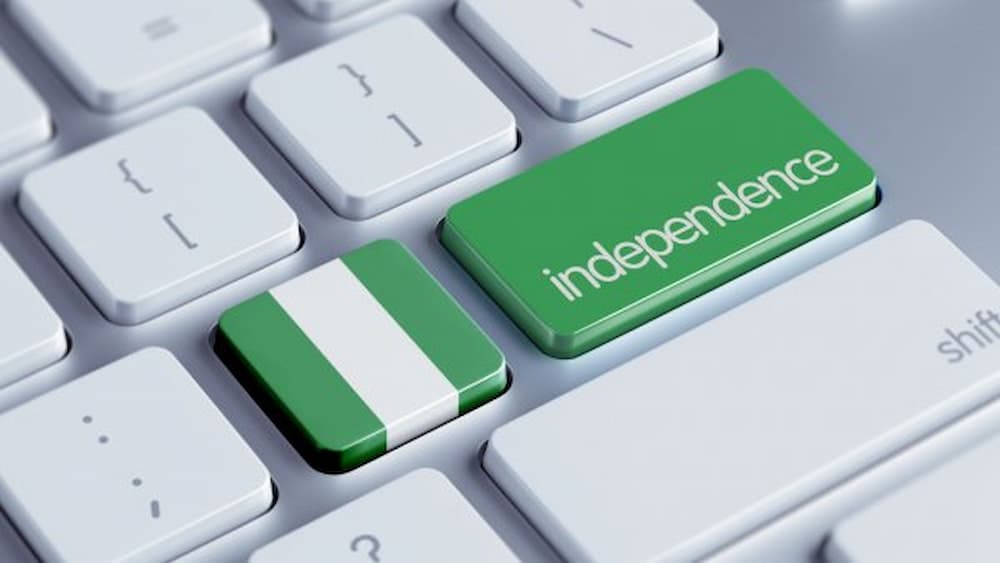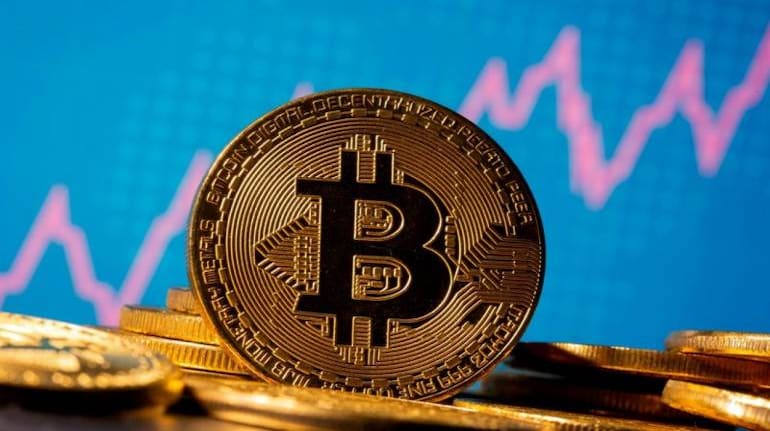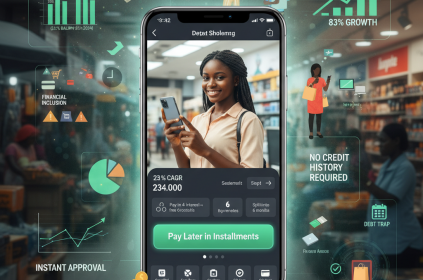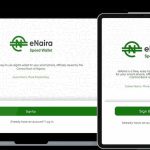….Nigeria Ranks 16th Among World’s Fastest Broadband
…Scores high on e-security
…Becoming hub for global tech talent hunt
….Records positive Fintech growth
…. Advances in communication/ Smartphone
….Transportation records improvements, like in EVs
As Nigeria celebrates sixty-first Independence today, the country has advancements in broadband, fintech and other technologies to celebrate too.
Although before 1960, Nigeria was not free as a nation. Also, sixty one years later, several negative developments still cast dark shadows on the country.
The country faces many challenges including high insecurity, poor economy and education system, high poverty rate and Naira depreciation.
Looking at these parameters for measuring the country’s development, one may say there are no reasons to celebrate.
Also, following the various drums of war and disintegration from various quarters, peace appears to elude the nation.
However, despite a gruesome civil war, Nigeria remains together 61 years later and this calls for celebration too.
Also, the country’s flag remains green and white, with a coat of arms that signifies rich heritage and dignity.
Similarly, the rivers Niger and Benue continue to meet and form a united “Y” shape. Consequently, on a general note, Nigerians must, at least, celebrate sixty one years of unity.
You may say these are less commensurate indices to score the nation good and call for celebration.
You may not be wrong though.
READ ALSO: Court Okays Nigeria’s Digital Currency, eNaira Launch As Company Sues CBN
However, if you are still in doubt as to positive reasons why you should celebrate Nigeria’s Independence, then look no further.
This article will point to you other areas where the country has done well, especially in the area of technology.
What you must know:
Nigeria has improved in several areas, advancing technologically to be among global comity of nations.
For instance, Nigeria has improved in her broadband speed growth, ranking 16th in the world’s Digital Quality of Life Index (DQL) 2021.
According to the new global study by a cybersecurity company, Surfshark, Nigeria also has a slightly faster mobile internet, ranking 96th in the world at 17.91 Mbps.
Similarly, the global ranking rated Nigeria 82nd among 110 countries in the world’s Digital Quality of Life Index (DQL) 2021.
Meanwhile, the company said although the Nigeria dropped by 1 in the 2021 DQL ranking, the country is still the best in Western Africa.
DQL is Surfshark’s study that evaluates 90 percent of the global population based on some indices.
Also, Surfshark’s CEO, Vytautas Kaziukonis, explained the reason behind the research and ranking as follows.
He said “for the third year in a row, we continue the Digital Quality of Life research, which provides a robust global outlook into how countries excel digitally. The index sets the basis for meaningful discussions about how digital advancement impacts a country’s prosperity and where improvements can be made.”
DQL’s currently study evaluated global population based on five set parameters that show the digital wellbeing of countries’ citizens.
The five parameters include – internet affordability, internet quality, electronic infrastructure, electronic security and electronic government.
DQL said South Africans enjoy the highest quality of digital life in Africa.
The breakdown:
The study shows that Nigeria lags with internet affordability ranking 107th globally.
But Nigeria is not the only country that has such poor performance.
The study revealed that all countries of the world fell short of this improvement as broadband is globally less affordable this year.
It said people have to work 11% more (25 min more) to afford broadband internet in 2021 compared to 2020.
Although Nigerian, according to the study, requires approximately a week’s worth of work to afford the internet in 2021, the country is not the least as countries like Côte D’Ivoire and Mali are even worse.
Corroborating this findings, the data from the National Bureau of Statistics, NBS, said a total of 144,949,194 Nigerian subscribers were active on the internet in 2021.
This is against 154,301,195 in Q4 2020.
NBS said this represented a -6.06% decrease in internet subscriptions QoQ.
This was according to NBS’ 2021 “Telecoms Data: Active Voice and Internet per State, Porting and Tariff Information.”
Similarly, DQL study revealed that Nigeria performed not very well in terms of electronic government, ranking 95th and e-infrastructure (90th).
Well, we saw and know how the government of Nigeria is seriously committed to the digitization of government processes.
We have also seen the NITDA coming to live as well as the adoption of the digital Naira by the Nigerian government.
Likewise, the study said Nigeria performed well in internet quality, ranking 56th.
Also, the country did well electronic security, ranking 46th in the world.
Nigeria electronic security is one of the best in the world. It is also the best in Africa.
This means that the internet quality in the country has improved in the last twelve months.
It also signifies that the cyber security architecture in the country is doing good.
ALSO READ: Breaking: Buhari Lifts Ban On Twitter With Conditions
This is partly evident in the planned nationwide deployment of the 5G technology and network in the country.
What it means is that the country attained full integration of the 4G network and is now ready for 5G.
The Minister of Communications and Digital Economy, Isa Ali Ibrahim Pantami, during a security summit in Abuja, said Nigeria has established three computer emergency centres to fight crimes across the country.
He spoke on the need to further adopt the 5G technology to fight cybercrimes and protect national assets.
He said: “There is a Computer Emergency Readiness and Response Team (CERRT) domiciled in Nigerian Information and Technology Development Agency (NITDA), an ngCERRT in the Office of the National Security Adviser and another one established at the Nigerian Communications Commission which will be commissioned on Thursday 30th September 2021.”.
Meanwhile, DQL describes Nigeria’s positive improvement on e-security thus:
“Despite the slight fall in the leaderboard, the country comes first in Western Africa and shows slightly better results in some pillars than the global average. Its e-security is among the TOP 50 worldwide, surpassing Africa’s DQL leader South Africa.”
These are clear reasons to celebrate!
Growth in Communication:
The communications technology in Nigeria has also recorded significant improvements.
For instance, the total number of 4G connections in Nigeria has enjoyed impressive growths.
The rate currently stands at 36,538,228. This is a huge improvement from 21,712,218 recorded in 2019.
A recent report on Worldwide broadband speed league 2021 by Cable UK reveals.
Also, it said Nigeria’s mean download speed stands at 8.68 megabits per second (mbps).
This means that downloading a 5Gb HD movie in Nigeria will take approximately 1 hour, 18 minutes and 39 seconds.
The report arrived at the result after testing 107,431 unique IPs around the country.
Similarly, Nigeria is about deploying the fifth generation technology (5G) nationwide.
The readiness to deploy the 5G network as well as the level of smartphone penetration in Nigeria further point to the tech growth in the country.
Fintech advancements:
Another area that Nigeria has recorded great improvement is in the area of financial technology.
“Nigeria alone has more than 200 fintech companies, with the sector attracting global interest from companies such as Mastercard and Visa” – CNN.
A report on the Nigerian FinTech landscape, titled, “Nigeria FinTech Census 2020: Profiling and defining the fintech sector,” said Financial technology in Nigeria is maturing.
Nigeria’s fintech growth is reflected in the profile of the firms, the breadth of coverage, the increasing level of global connection and rising levels of profitability, a Nairametrics’ post says.
The country is classified as a developing FinTech economy compared to more mature countries like the UK, Singapore, Australia, Sweden and India.
Estimates say Nigeria’s FinTech revenues will reach $543 million by 2022.
This growth, according to the estimates, would be driven by increasing smartphone penetration and the unbanked populations.
“In 2019, Nigeria officially recognized its first FinTech unicorn, with Interswitch achieving a valuation of $1 billion based on a $200 million investment from VISA. Following shortly in 2020, Stripe, a US-based financial services company, agreed to buy Paystack in a $200 million deal, just five years after Paystack was launched,” Says Nairametrics.
Fintech areas thriving in the country includes:
-
Payments, Mobile Money and Digital Banking:
Nigeria boasts as one of the world’s countries with favourable policies promoting financial inclusion.
Also, there has been a high growth in infrastructure supporting mobile payments, making the country a cashless economy.
The likes of Abeg, Patricial, Kuda and Pigyvest are examples of fintech platforms that have liberated Nigerians from previously tedious life processes.
-
Lending Technology Platforms:
Nigeria has seen an explosion of many retail digital lending platforms.
Examples of these platforms includes: Some examples include Carbon, Fairmoney, Aella Credit and Branch.
Also, major financial institutions like banks have joined the retail lending train.
For instance, Access Bank has floated QuickBucks; Sterling Bank has Specta while GTBank runs QuickCredit.
-
Savings and investments:
The Savings and investments segment of the Nigerian fintech is also advancing, making lives easier for Nigerians.
The many savings platforms offer attractive plans with good interests and return on investments.
This has made the sector booming. It has also helped to better the lives of Nigerians.
-
Enterprise services and Infrastructure:
The Nigerian enterprise service and infrastructure has also recorded significant growth and improvements.
This segment of the fintech has brought about the ease by some banks in digitizing their services.
It has equally helped to improve the credit infrastructure and the API linking of banks’ customer’s accounts with third party applications.
Also, the fintech platforms in this segment have brought about improved financial solutions provisions, especially in the banking enterprise.
Examples of credit platforms infrastructure providers include Migo and Pngme.
Similarly, AppZone, FinTrak, Seamfix dominate the enterprise solutions providers segment.
Likewise, API providers who connect bank accounts to third-party applications includes Okra, OnePipe and Mono.
-
Digital currency adoption/ Cryptocurrency:
The country has also seen wider adoption and greater increase in the adoption of digital currency.
According to data from Statista.com, Nigeria in the last five years, has traded 60,215 bitcoins, valued at more than $566 million.
The trading, apart from US, is largest volume worldwide on Paxful, a leading peer-to-peer bitcoin marketplace.
Similarly, even the country’s Central Bank (CBN) is about to launch a digital currency, the eNaira.
Nigeria is now the hub for sourcing of Tech talents:
Many Nigerians have acquired technology skills in global demand, making the country the first port of call in Africa for tech talents.
Among the tech skills Nigerians have are Artificial Intelligence, Machine Learning and Data Science & Analytics.
Others are: Data Engineering, programming, Data Visualization, etwork and Information Security (Cybersecurity) and Cloud Computing.
Just recently, a 22-year-old Nigerian drone maker, Ignatus Asabor, was flown abroad by a company in Finland.
This was after the company employed him for his drone-making skills.
There are many Nigerian innovators spread across the country.
Transport sector growth rate:
Nigerian has also recorded significant growth in the transport, with the industry advancing in technology.
The National Bureau of Statistics (NBS) in its Q2 2021 GDP report, said Nigeria’s transport sector recorded high growth.
The sector comprise of the following sub-sectors:
Road Transport; Rail Transport and Pipelines; Water Transport; Air Transport; Transport Services; and Post and Courier Services.
NBS said all the six sub-sectors recorded positive growth rates in the second quarter of 2021.
It said quarter on quarter growth stood at -5.60%.
Also, the Nigerian government has been in the fore-front of tech adoptions in the transport sector.
The government has invested hugely in electric vehicles through the National Automotive Design and Development Company (NADDC).
Consequently, Nigeria’s Vice President, Yemi Osinbajo, recently, drove Nigeria’s first locally assembled electric vehicle (EV), Hyundai Kona.
Car manufacturer, Stallion Motors, launched the electric vehicle.
Also, recently, popular transport and logistics company, GIG Logistics deployed a fleet of EVs assembled by Jet Motor Company.
These show how technologically responsive Nigeria is among the comity of nations.
We have the 1,343 kilometres (835 miles)-long Lagos–Kano Standard Gauge Railway under construction in Nigeria.
Implication:
Although many Nigerians would say that there is nothing to celebrate about Nigeria’s 61st independence.
However, this article has shown you that there are so much to celebrate.
Despite the negative developments casting shadows on the country, there are many positives to celebrate.
Finally, Nigeria is still developing and the country will someday overtake the world in technology advancements.
Therefore, roll out the drums and sound the Tambourines for Nigeria is 61 today!
Happy Independence to Nigeria and Nigerians.



















 and then
and then